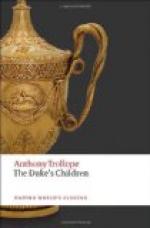Then there had been some fitful confidence during those few days of acute illness. Why should not the girl have the man if he were lovable? And the Duchess referred to her own early days when she had loved, and to the great ruin that had come upon her heart when she had been severed from the man she loved. ’Not but that it has been all for the best,’ she had said. ’Not but that Plantagenet has been to me all that a husband should be. Only if she can be spared what I suffered, let her be spared.’ Even when these things had been said to her, Mrs Finn had found herself unable to ask questions. She could not bring herself to inquire whether the girl had in truth given her heart to his young Tregear. The one was nineteen and the other as yet but two-and-twenty! But though she asked no questions, she almost knew that it must be so. And she knew also that the father was, as yet, quite in the dark on the matter. How was it possible that in such circumstances she should assume the part of the girl’s confidential friend and monitress? Were she to do so she must immediately tell the father everything. In such a position no one could be a better friend than Lady Cantrip, and Mrs Finn had already almost made up her mind that, should Lady Cantrip occupy the place, she would tell her ladyship all that had passed between herself and the Duchess on the subject.
Of what hopes she might have, or what fears, about her girl, the Duchess had said no word to her husband. But when she had believed that the things of the world were fading away from her, and when he was sitting by her bedside,—dumb, because at such a moment he knew not how to express the tenderness of his heart,—holding her hand, and trying so to listen to her words, that he might collect and remember every wish, she had murmured something about the ultimate division of the great wealth with which she herself had been endowed. She had never, she said, even tried to remember what arrangements had been made by lawyers, but she hoped that Mary might be so circumstanced, that if her happiness depended on marrying a poor man, want of money need not prevent it. The Duke suspecting nothing, believing this to be a not unnatural question expression of maternal interest, had assured her that Mary’s fortune would be ample.
Mrs Finn made the proposition to Lady Mary in respect to Lady Cantrip’s invitation. Lady Mary was very like her mother, especially in having exactly her mother’s tone of voice, her quick manner of speech, and her sharp intelligence. She had also her mother’s eyes, large and round, and almost blue, full of life and full of courage, eyes which never seemed to quail, and her mother’s dark brown hair, never long but very copious in its thickness. She was, however, taller than her mother, and very much more graceful in her movement. And she could already assume a personal dignity of manner which had never been within her mother’s reach. She had become aware of a certain brusqueness of speech in her mother, a certain aptitude to say sharp things without thinking whether the sharpness was becoming to the position which she held, and taking advantage of the example, the girl had already learned that she might gain more than she would lose by controlling her words.




